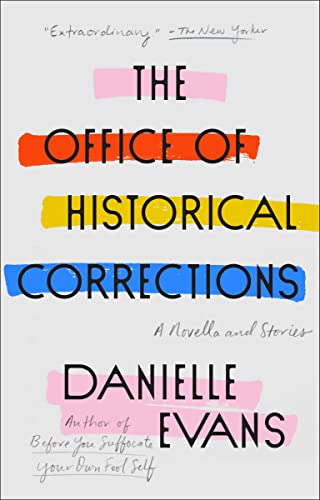The Office of Historical Corrections

This is probably the best book that I've read this year. Danielle Evans has created a literary masterwork that reels you in and keeps you on the edge of your seat, particularly in my two favorite stories, because this is a short story collection. And like all short story collections, some of the stories are better than others, but there wasn't a single story in this book that was particularly bad.
When I got this from my library's Libby App, I actually didn't look at the description, I judged a book by its cover, so I thought this was going to be about historical corrections, like "You were taught this in 3rd grade, but here's what really happened." That is not at all what this book is about, the title comes from the office that the main character works at in one of the short stories. So I was completely unprepared for what I got, and it worked out to be a great surprise.
My favorite story in the book is Anything Can Dissappear. Normally my reviews are really spoilery because I want my audience to go on this reading journey with me, but I really don't want to do that here, because y'all need to read this book. But this story legitimately made me cry, which is pretty rare for me with media of any kind. This is hands down the best short story I have read this year. Evans has a way of giving you this really straightforward texual style that almost transforms and transports you into this story- and that might have been helped by the fact that I was listening to it, I had the audiobook version- but her writing is really similar to someone sitting down and telling you a story that happened to someone they know; it's conversational, and because of that I was concerned that this was a true story, that there were real events that had actually happened; I got that invested into these characters that I didn't realize they were characters in a story, but rather thought that they were real people.
The titular novella is a mystery story wherein a government agent is sent to investigate a plaque that had been put up to commemorate a murder that had happened in a small town. A black man in the 1930s had been trapped in his small buisness while a bunch of racist white people burned it to the ground- which is totally a believable thing that has happened here in the US. The folks who killed him then took a commemorative photograph where they were all standing and smiling in front of the rubble, and captioned the back with something proudly racist like, "Keeping the town white," or some bullshit. So it seems like a pretty cut and dry case, but as this story unfolds the mystery has multiple layers that will keep you on the edge of your seat, and the characters in the present intertwine with this mystery from the past in a way that is really interesting to me as a psychologist; you can see generational trauma and generational secrets create the present. It is masterfully written and my second favorite story in the book.
My least favorite story in the book is probably the one about this college kid who gets cancled because I just couldn't resonate with the main character. She just seemed like a pure idiot, and I'm not saying, "Oh, I can't connect to idiots because I'm a genius and have no ability to emotionally connect to people who are below me, because I'm an educated wonam." No, I'm saying that I was raised in a trailer in Appalachia and this woman is dumber than a bag of rocks from that perspective. She does a big racism by scaring a lady who goes to school with her by posing in a Confederate Flag swimsuit, and when the lady is like, "Hey... maybe don't do that?" she starts going full blown, "The south shall rise again," by putting the flag in her window, scheduling a press conference to talk about how the confederates weren't that bad actually, and literally sliding a flag under this chick's door, which scares her so bad she makes the college move her. There's no reason for her to just be a bitch, and no redemption.
The story tries to explain this with a backstory about her black best friend that she had growing up, about how their mothers had cancer at the same time, and the main character's mom died but the friend's lived, and she's like, mad about it. Which is fine, that's a fine backstory to have for this character, but it doesn't really explain anything, because she doesn't seem to generalize that trauma at all in a way that would manifest in racism, nor does she seem to understand that anything she did was racist, so I didn't really get that one. I think she might just be a bitch. Like there's no character growth, she starts a stupid bitch and she seems to end a stupid bitch. So I just kinda feel like, "fuck this character and the horse she rode in on,".
It's still masterfully written, it's just my least favorite of the stories. So just because something doesn't resonate with me doesn't mean it won't resonate with other people. And every other story I was able to connect with the characters, but the last two especially. And that mystery element of the final story makes me really wish that Evans would write a full length mystery novel.
All in all, this was a wonderful experience and I heartily reccomend that everyone check out this book.

